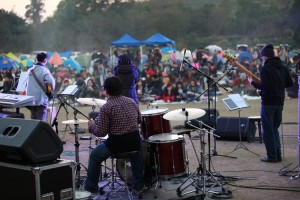Music festivals bring alternative sounds and fresh vibes to Hong Kong
By Edith Lin
At nine o’clock on a cold Sunday morning, a melody wafted through a Sheung Shui campsite. A singer-songwriter was crooning a folk song to the crowd as local villagers walked around to serve breakfast – homemade steamed buns and warm soya milk. Further down the field, campers were boiling water on canister stoves as dogs ran around freely and toddlers tottered between the tents.
This was the second day of Grasscamp 2014, one of the many new music festivals in Hong Kong. Other local music festivals include Silvermine Bay, Freespace Fest and Grassfest. For fans of foreign music, Clockenflap and Taiwan Calling have also hit town in recent years.
The outdoor music event as we know it today began with the 1969 Woodstock Festival in New York state. During the weekend, which later became synonymous with 1960s counterculture, over 400,000 young people came together to celebrate peace, love and rock and roll.
The trend gradually spread to other parts of the world. The annual Japanese Fuji Rock Festival kicked off in 1997, the Midi Festival in China began in 2000.
Hong Kong’s first music festival was Rockit, which opened in Victoria Park in 2003 and was held annually until 2006. But it was not until in 2008, when the likes of Clockenflap and Grassfest surfaced, that the trend started to take off.
Anthony Fung Ying-him, the director of the School of Journalism and Communication at the Chinese University of Hong Kong, believes the change is testimony to the public’s fight for more public space.
“Basically Hong Kong lacks performance venues and the public space was not open to use,” says Fung. “Public pressure has forced the government to open up public spaces like Kwun Tung Ferry Pier, areas under flyovers or the open area in front of Hong Kong Arts Centre for citizens to play music.”
Due to the increasing accessibility of public space, more music festivals are held outdoors. They usually feature a variety of performers, ranging from established indie bands to the up-and-coming, and the events can last up to a few days. Unlike conventional concerts, the audience can do things other than watch the performances. For instance, they can picnic, dance, play games or even ride bikes.
For Yuen Chi-chung, a music critic and organiser of Freespace Fest, a music festival is like a buffet – there is always something for everyone. “The freedom you get in a music festival is what really makes it tick,” says Yuen. “Even if you don’t like the music, you can always go eat or drink a beer or two.”
The performances are as diverse as the range of activities available, from classic rock and roll to blues, to hip-hop and electro. All genres of music are welcome with the only exception being mainstream pop. Yuen cites the controversy which arose over the inclusion of Cantopop singer G.E.M. in the Clockenflap line-up last year as evidence of the antipathy to pop.
Clockenflap was started by three Britons living in Hong Kong. Inspired by international festivals like Glastonbury, it is the biggest music and arts festival in Hong Kong and aims to introduce overseas music and alternative art such as silent discos, installation art and film tents to the city.
“Audiences go to Clockenflap because they want to see overseas independent bands like Franz Ferdinand or Black Rebel Motorcycle Club,” says Yuen. “Having mainstream singers twists the nature of music festivals.”
Even though more open venues are now readily available, not all are suitable for music festivals. Concerts and music festivals were barred from the Hong Kong Stadium after a few gigs because they disturbed nearby residents. And Yuen recalls it took years of trial and error to figure out where to place the performance stages at the West Kowloon Cultural District in order to minimise noise to surrounding residents.
Thickest Choi Chi-hau, founder of Grasscamp, has learnt the hard way that the weather can be a nuisance too. Choi had to cut short an outdoor festival at West Kowloon last December due to an unexpected winter downpour.
Unwilling to let his efforts go down the drain, Choi re-launched Grasscamp on the Ma Tso Lung Campsite in Sheung Shui in early January. At short notice, he scrambled together a list of 10 local independent acts. He also set up an online crowdfunding campaign and raised close to HK$30,000 in less than a month. As the event was free of charge, Choi admits he is unlikely to break even as the cost of putting on the event was closer to HK$80,000. Nevertheless, he was overwhelmed by the support of music lovers.
To go with the new location, Choi thought of incorporating local elements in the event. This proved to be easy as the local Kwu Tung villagers readily agreed to provide traditional Chinese snacks such as tea eggs and rice flour puddings for sale. “Seeing as we were already there, it was best if we benefitted the local villagers,” says Choi.
Amateur singer-songwriter and history teacher, “Chu Sir”, even volunteered to perform his self-penned folk songs at breakfast. The sometimes humorous lyrics told of the history of the local area.

“When people think of , Sheung Shui and Fanling they mostly think about parallel goods traders. But there is more than that,” says Choi. “The context here [Ma Tso Lung] is unlike West Kowloon. West Kowloon is just a plain field whereas here there is a lot of history and culture. Therefore I wanted to accomplish more than entertainment.”
Things turned out better than Choi ever expected. Over 1,000 people showed up over the two-day event, with 300 camped out overnight despite an overnight temperature of four degrees Celsius.
Roy Tam, a first-time participant at Grasscamp, brought his young children and relatives along to experience camping. “We came here hang out as a family. Music is a bonus for us,” said Tam. “Music festivals are different from concerts because my children can’t go to concerts. But here it is more flexible.”
Unlike Tam, twenty-somethings Ben and Felix have more experience of music festivals. They first met at the Silvermine Bay Festival and are now regular music companions. “At a music festival, not only can you listen to music, you get to make friends and have fun with people you don’t know,” says Felix.
Not only do audiences get to mingle at music festivals, musicians can also meet like-minded artists. After befriending the local band Senseless at a music festival, independent singer-songwriter Serrini was invited to be a guest on their show. Serrini was over the moon when Senseless offered to be the backing band in her upcoming show.
Whilst Serrini says she enjoys having a whole show to herself, she also savours the chance to reach out to what she describes as a more thoughtful audience at music festivals.
“What I like about hosting my own gig is that the audience comes only to hear me sing,” says Serrini. “What I also like about music festivals is that I can get in touch with an audience who don’t have previous knowledge of me but who would come to search for more after [they hear my music] for the first time.”
Compared to gigs at shopping malls and music festivals organised by property developers in mainland China, local independent music festivals pay musicians very little, with most of them only covering travel expenses. But this does not deter Serrini from performing at festivals in Hong Kong, or compel her to sign to a record label.
“Very few independent musicians are able to make a living purely through their music. But we are satisfied with not being mainstream, not very rich,” says Serrini. “I really like the music festivals in Hong Kong. They actually provide more opportunities for local musicians. When I perform, I am treated as a musician, not an entertainer.”
Edited by Emily Chung










































